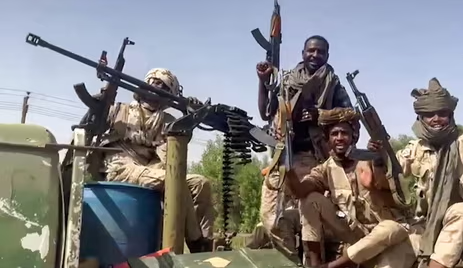Since the brutal conflict erupted in April, the paramilitary Rapid Support Forces — which evolved from the Janjaweed militia accused of atrocities in Darfur — has gained control of much of Khartoum from the regular army.
The fighting has seen 2.8 million people flee the capital, UN data shows, but now many of them who headed south to the neighboring state of Al Jazira fear the RSF’s notorious fighters are moving into their safe haven.
Hussein Mohammed was driving his minibus south of Sudan’s capital when his blood ran cold at the sight of a paramilitary convoy advancing into areas so far largely spared from the war.
Mohammed watched in horror as dozens of RSF vehicles drove through the town of Al Maseed on Monday evening, eventually setting up a checkpoint 80 kilometers (50 miles) south of the capital.
“I was near Al Maseed when I suddenly saw 43 pickups and armored vehicles approaching,” he said. “They later put up a checkpoint near the village of Om Maghad” north of Al Kamlin.
By Tuesday, the RSF had reached the town of Al Kamlin, a little more than 30 minutes’ drive farther south where they posted footage on social media of fighters distributing “urgent humanitarian aid”.
Anxious residents could hear the booming sound of air strikes inch further south.
“We couldn’t sleep all night,” Ahmed Mohieldin said from Al Kamlin, after word of the RSF’s presence on the town’s outskirts quickly spread, along with a sense of impending terror.
“Everyone’s in a state of panic, there are rumors everywhere,” he told AFP from a roadside cafe.
Around him, every store had shuttered its doors, with shopkeepers haunted by knowledge of the violent lootings and killings committed across Khartoum.
Since April 15, fighting between the two sides — both of whom have been accused of targeting civilians — has been mainly concentrated in Khartoum and the vast western region of Darfur.
Many of those who fled Khartoum for Al Jazira state have had their houses back in the capital taken over by the RSF, who have evicted families and claimed abandoned buildings — and everything inside — as their own.
War inching closer
On Tuesday, the military launched drone strikes — usually limited to the capital itself — on RSF checkpoints in Al Bagir, 50 kilometers south of Khartoum, witnesses told AFP.
Restless civilians know all too well the violence at their gates.
On social media, the horrors in Khartoum play out in a loop: activists report deaths, as civilians remain trapped in the fighting and a seemingly endless column of smoke rises from the capital.
From the western region of Darfur, reports have been less frequent, as entire cities routinely descend into blackouts only for horrific massacres to be reported later.
Accusations of the RSF and allied militias carrying out killings based on ethnicity in Darfur have triggered a new investigation by the International Criminal Court.
Still, authorities dole out reassurances.
On Sunday, Al Jazira’s acting governor Ismail Awadallah summoned journalists to assure them the state’s northern region “is now a zone of military operations and is being secured by the command of the armed forces”.
Al Jazira, a vast state between the Blue Nile and the White Nile known for its fertile soil and cotton fields, has been spared the war’s violence, but not its impact.
This year, its usually abundant agricultural lands lay fallow.
Schools and public buildings have become makeshift camps housing the displaced.
Its industrial area has been inactive for months, during which Al Jazira has “lost 88 percent of its revenue”, according to state finance minister Jaafar Abo Shouk.
Despite government employees going without salaries since the conflict flared, public school teachers are still welcoming local and displaced children.
Among them was Thouraya al-Hady, a 43-year-old teacher in Al Kamlin who has been worried sick since Monday.
“We’ve been scared since the war began, but now the fear is so much greater,” she told AFP.
“We hope the war doesn’t come to us. We’ve already been feeling the pain from afar,” she said, terrified the violence is now at her doorstep.



